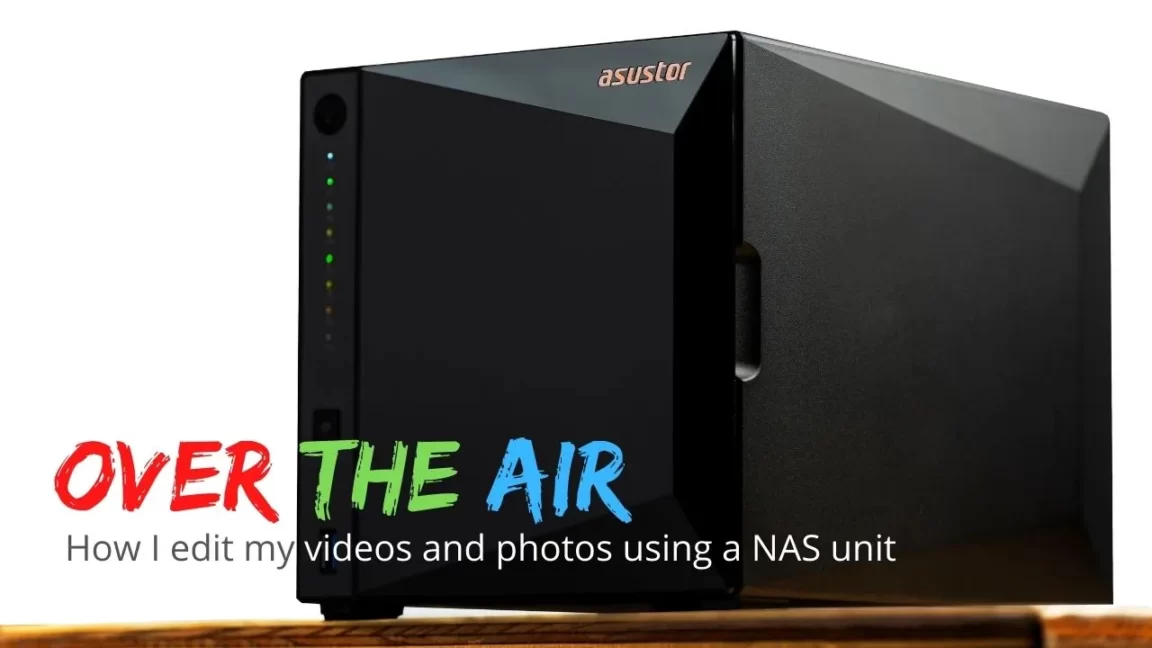For you that follow this blog, you probably saw my last post about NAS, where I took the Nimbustor 4 for a spin. And I have to say, this NAS plant the seed on my heart on having a personal cloud system that I can trust all my work files and, why not, entertainment as well.
With this in mind, me and Asustor are working together to make, not just this review happens, but also my personal cloud system. Well It’s not just a cloud, system, but also my work drive and part of my peace of mind, knowing that I have hard drives working in redundancy inside the Asustor DRIVESTOR 4 Pro.
And today I will give you a brief look on how is my workflow with this unit, editing videos, photos and also backing up files.
DRIVESTOR 4 PRO
I will start talking that this is not a NAS unit designed as a big workstation or server environments, even thought it has PRO on its name, for this purpose Asustor has more robust alternatives, but like they say, don’t judge a book by its cover.
But I have to say, for the most part and for the use I put this box, it does the job, for a small or Medium creative company. It shares lots of similarities with its older brother, the Nimbustor 4, and this is a good thing if you are already deep into the Asustor system.
For me, the bulk of the use is storing video and photo files, to be worked with later. After any shoot I jump program my data dump, normally direct to the NAS unit, and when it comes to the time of working on the footage or images all I need to do is to access the unit via my files explore, yes the unit is mapped to my system, so I can access it better later.
And for this purpose this unit world beautifully, I have no complaints about it. Being able to drop my files from the front USB in the unit direct to my Data Dump folder with just one click is something great. Or even backing up files and documents direct from my phone, without having to send them to other services like Google Docs, just to have these files accessible over my own network, is a must on parts of my workflow now.
Working with video editing
My main use for a NAS unit is for dumping files on it, I guess this is the use for the majority of the user around there. And eventually, editing directly from the NAS.
This is what I’m putting this unit through the last months, and I am pretty satisfied with that. No shortage of disk space keep my piece of mind. The ability of editing files direct from it helps me a lot with my file management and improve my productivity to have everything consolidate on the same unity.
Working with Adobe Premiere for cutting movies and building sequences, and with Da Vinci Resolve for my colour work, is not a problem with this unit.
My process is very simple. First, I configured the Drivestor 4 to back up my cards using the form USB, so I just need to plug my card reader and press a button and all the files will be copied to my data bump folder.
This is super easy to do with the new ADM interface, and after that we are off to the races. Since, my NAS is mapped to my system as a new drive unit, I just need to jump to the system file explorer and create my folder structure.
After that, I can star to create my project on Adobe Premiere and point it to the folder projects on the NAS unit, copy my footage files to its respective folder, import the footage on Adobe Premiere and start my work.
Normally to speed things up, I create proxies in Premiere, this helps me to process large 4k files during the editing process. Also, this helps me to edit direct from the Drivestor 4, avoiding hiccups and slow-downs.
After my proxies work is done, it’s time to start working on the edits. And since all the files are living on my NAS, and my workstation is always connected to my network, I have access to my files all the time.
After lasting everything down and getting a picture lock on my edits, it’s time to migrate to Da Vinci Resolve to make the colour work. And this process couldn’t be easier, all I need to do is to export two versions of my Premiere timeline, one for cutting reference, normally low quality works, and another one with the best image quality possible.
This I also export direct to the Drivestor 4, with no problems. The only limitation here is lack of a wired connection between my workstation and the network, which can be improved with some cables, and will make this process a bit quicker.
After that I just need to jump into Resolve, re-cut the scenes and start the colour correction process. On Resolve I use the same files I exported from Adobe Premiere.
Running 4k clips for colour correction from the NAS is not that smooth as I would expect, but as I mentioned before I’m accessing the files over Wi-Fi and, the unit has somewhat a limited processing power. However, the bulk of the colour correction work is done with static images, so I can deal with the eventual struggles during playback.
If I need to grade something more intricate, what I normally do is to copy all the files to my workstation SSDs and work from there. This all I can rely of the SSD speeds and have a much better performance.
With the job done, it’s time to export back to Adobe Premiere and rearrange my timeline, put my graphics to finish the sound mixing, which can be done in Fairlight inside Resolve also, and call it a day.
Market Alternatives
Some alternatives, in this price range, that we have in the market are great, but I have to argue that the Drivestror 4 Pro is on the top of my list now. Sure there are a couple of things that could be changed to make it an even better unit, one of them are the memory size, or the ability to upgrade. Sadly, depending on what you are doing with the unit, 2gb aren’t enough.
On my case scenario here, 2gb workers fine, I am able to access all my files over the network and even use the NAS as my work drive. But for sure, it could benefit from a more robust RAM.
One thing that blow some competition out of the water is the expansion pathways, where you can link other disk unit to work as one ginormous NAS, up to 16 bays,
But I have to say the compromises made here to achieve this price point are understandable, and I can live with that.
Just for the sake of comparison, look at the table below to see what the Drivestor 4 Pro can over its closest competitor.
| Category | ASUSTOR DRIVESTOR 4 Pro (AS3304T) | Synology DiskStation DS418 |
| CPU | Realtek RTD1296 | Realtek RTD1296 |
| RAM | 2GB DDR4 (not expandable) | 2GB DDR4 |
| Drive bays | 4x (SSD/HDD) | 4x (SSD/HDD) |
| Capacity | 72TB | 72TB |
| Expansion support | ✓ (max 16 bays) | N/A |
| Cooling | 1x 120mm fan | 1x 92mm fan |
| Ports | 1x 2.5Gb LAN3x USB 3.2 Gen 1 | 2x 1Gb LAN2x USB 3.2 Gen 1 |
| PCIe | N/A | N/A |
| Power draw | ~23.1W | ~26.49W |
| Dimensions | 170mm x 174mm x 230mm(6.69 x 6.85 x 9.05 inches) | 166mm x 199mm x 223mm(6.53 x 7.83 x 8.77 inches) |
| Weight | 2.2 kg(4.85 pounds) | 2.28 kg(5.02 pounds) |
| Price | $330 (USD) | $398 |
Is it worth it?
I can for my experience with Asustor products that the team at Asustor is always on the ball, they are listening to what the consumer wants and providing solutions to our needs. As for you buying a NAS unit, I have to say if you need something that you can expend and also need to have access s to your files no matter where you are, I would recommend you to look into buying a NAS unit. I can say the Asustor DRIVESTOR 4 Pro is a great value for the money, Paring this with good hard drives you will be set for a good chunk of time. If your needs are more robust, I will say to you to look up for units with better processor and more memory, like the Asustor Lockerstor 4, but nevertheless find a good unit to back up and maintain your files.
And you, leave in the comments what you are doing to improve your workflow.




